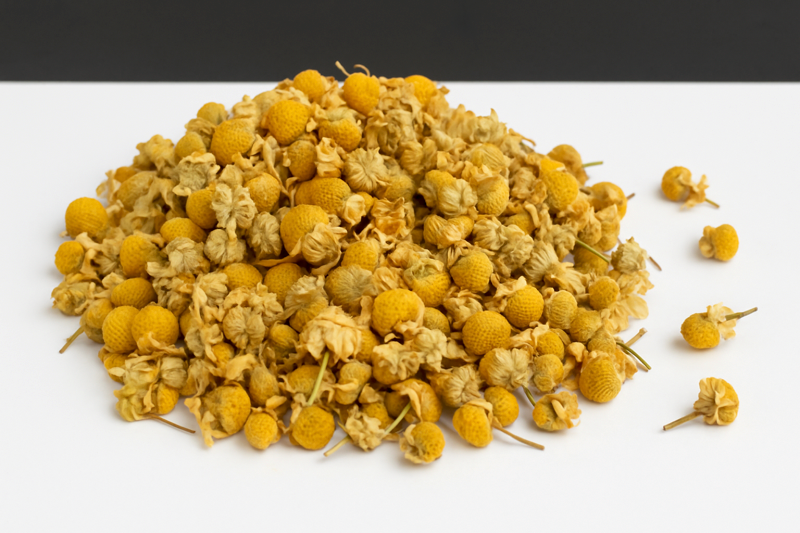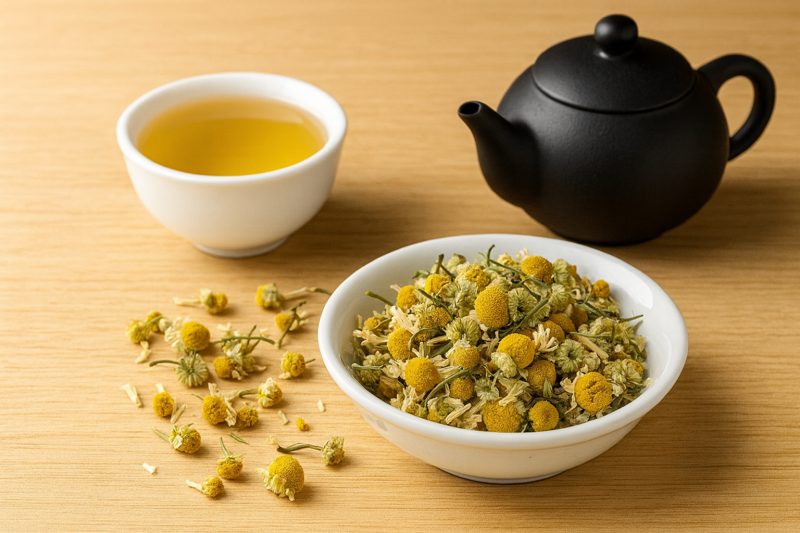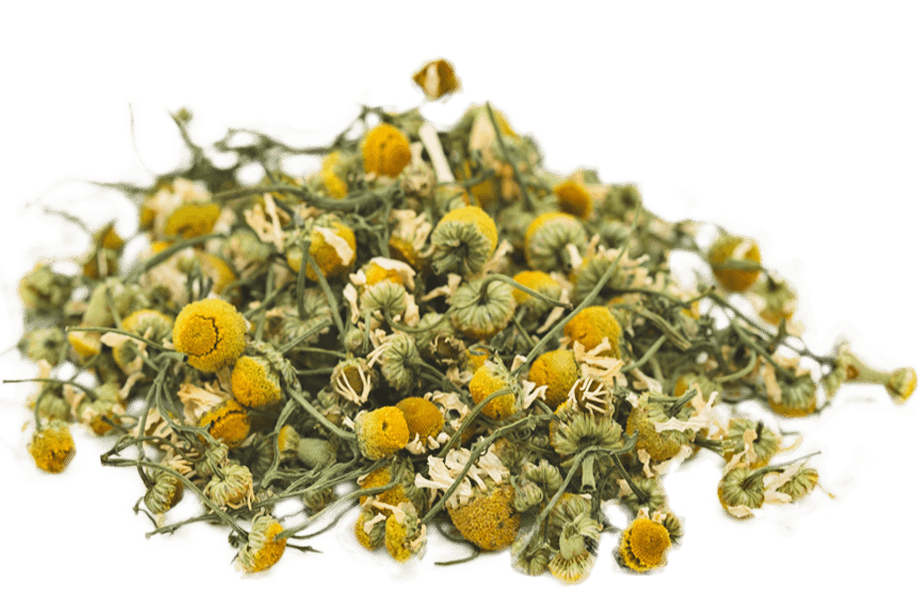Chamomile Tea
Calming, floral, and gentle — the timeless tea for relaxation.
- Category: Herbal tisane (not a true tea, caffeine-free).
- Origin: Europe and the Middle East originally; now widely cultivated worldwide.
- Harvest: Summer and early autumn, when chamomile flowers are in full bloom.
- Grade: Whole Flower Chamomile; Cut Flower Chamomile; Powdered Chamomile



Tasting Profile
Brewing Guide
- Tea-to-water ratio~2–3 g dried chamomile flowers per 200 ml water.
- Water temperature95–100 °C (203–212 °F).
- Steeping time5–7 minutes for full flavor and aroma release.
- Infusions1–2 infusions; first is floral and sweet, second lighter and delicate.
Background & Story
Chamomile tea, made from the dried blossoms of the chamomile plant (Matricaria chamomilla or Chamaemelum nobile), is one of the world’s oldest and most beloved herbal infusions. Known for its soothing properties and naturally caffeine-free nature, chamomile has been cherished for centuries as both a comforting drink and a traditional remedy.
The origins of chamomile use stretch back to ancient civilizations. The Egyptians revered chamomile for its healing qualities and even dedicated it to their sun god, Ra. It was used as a remedy for fevers, stomach ailments, and as a cosmetic in skin care. In Greece and Rome, chamomile was praised for its calming effects, often prescribed by physicians to ease digestion, reduce inflammation, and promote rest. Its name comes from the Greek chamaimēlon, meaning “earth apple,” a nod to its distinctive apple-like aroma.
Chamomile tea spread throughout Europe in the Middle Ages, where it became a household remedy for ailments ranging from insomnia to colds. Herbalists and folk healers used it in tinctures, poultices, and infusions, while everyday people valued it as a gentle, accessible source of comfort. With time, chamomile became a staple of European herbal traditions, eventually spreading worldwide as global trade expanded.
Modern chamomile cultivation occurs across many regions, including Egypt, Eastern Europe, Germany, and South America. Premium chamomile tea is made from whole dried blossoms, which release the fullest flavor and aroma. The infusion is renowned for its sweet, floral, and honey-like profile, with a smoothness that appeals to all ages.
Today, chamomile tea is one of the most popular herbal teas globally, enjoyed not only for its calming effects but also for its digestive, anti-inflammatory, and sleep-promoting qualities. Whether sipped before bed, during moments of stress, or simply as a comforting ritual, chamomile tea continues its long legacy as nature’s gentle healer.
Benefits
- Promotes relaxation and better sleep with natural calming compounds
- Supports digestion and helps soothe stomach discomfort
- Provides antioxidants that protect against oxidative stress
- May reduce inflammation and support immune balance
- Naturally caffeine-free, making it suitable for all ages and evening use
Serving Suggestions
Pairings
- Honey-drizzled biscuits or oat cookies for a sweet calming combo
- Light pastries such as scones, shortbread, or sponge cake
- Fresh fruit like apples, pears, or peaches to complement its floral notes
- Soft cheeses like brie or ricotta for a gentle, creamy pairing
- Simple green salads with a mild vinaigrette for a refreshing balance
Teaware
- Glass teapot (to admire the chamomile flowers as they bloom)
- Ceramic mug (for cozy, comforting daily use)
- Tea infuser basket (ideal for brewing loose whole flowers easily)
Nutrition Facts
Serving Size: 1 cup brewed Chamomile Tea (240 ml)
| Nutrient | Amount per Serving | % Daily Value* |
|---|---|---|
| Calories | 0–2 | 0% |
| Total Fat | 0 g | 0% |
| Sodium | 0 mg | 0% |
| Total Carbohydrates | 0 g | 0% |
| Protein | 0 g | 0% |
| Vitamin C | Trace | <1% |
| Vitamin A (beta-carotene) | Trace | <1% |
| Calcium | 2–4 mg | <1% |
| Potassium | 5–15 mg | <1% |
| Magnesium | 1–2 mg | <1% |
| Caffeine | 0 mg (naturally caffeine-free) | — |
| Apigenin (flavonoid) | Present | — |
| Polyphenols | 20–40 mg | — |
| Essential Oils (bisabolol, chamazulene) | Present | — |
**Percent Daily Values are based on a 2,000 calorie diet.
† Functional compounds such as apigenin, polyphenols, and chamomile essential oils do not have established %DV but contribute to Chamomile Tea’s calming and soothing health benefits.